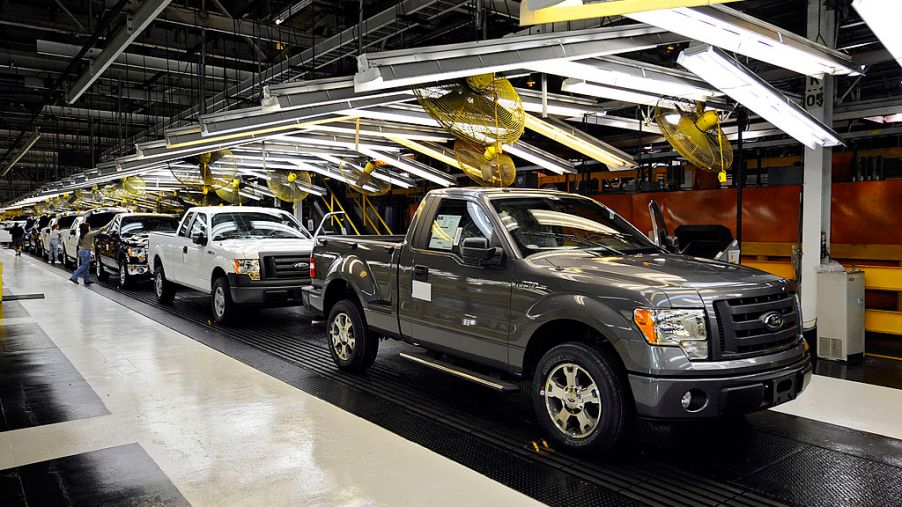
Pickup Truck Sales Can Reveal Some Important Information About the Economy
Analysts have long relied on automotive sales as a key economic indicator. However, full-size pickup truck sales data is a less traditional measure of economic health. Pippa Stevens of CNBC reports news from a company that uses this slightly offbeat method to find clues about the direction of the U.S. economy. Its method and results may surprise you.
How truck sales data signals the economy’s direction
DataTrek Research analyzes sales of large pickups over time to learn about how well small businesses are doing. By extension, the firm gets more visibility into the U.S. economy overall. The research firm claims that this approach provides a snapshot of a wide range of industry sectors from oil field service to the local landscaping company to food manufacturers.
New full-size truck sales have been a reliable economic indicator for DataTrek since the ’90s. The reason why this data works so well is that buying a new pickup is a discretionary choice for these businesses. They can always opt to have an older truck repaired instead of buying a new one if they are concerned about business conditions.
What the numbers reveal
For its analysis, DataTrek looked at U.S. dealer sales of several of the most popular trucks in the country. They included the Ford F-150, Ram trucks , the Chevrolet Silverado, GMC Sierra, the Toyota Tundra, and the Nissan Titan.
For 2019, over 2.4 million of these trucks were sold at an average of $30,000 each, which is equal to a $72 billion market. These numbers are 2.3% higher than those for 2018.
DataTrek noted a slowdown in sales in December, making total sales 1.3% lower than December of 2018. But the firm attributed this change to the anticipated launch of the 2020 Chevrolet Silverado.
Sales slowdowns are customary ahead of the rollout of a new model, and this one reflected a decrease of 9.4% in Chevy Silverado sales. And even though December indicated decreased sales, October and November were strong at 3.5% and 1.7% respectively.
Despite the general uncertainty about the economy, DataTrek reported that truck sales were basically steady from month to month in 2019. The best month for sales was August with an increase in sales of 10.0%. The worst was -4.5% in September. The variability of these numbers is typical around the end of certain model years, to DataTrek.
Will pickup truck sales continue to rise?
The research firm’s co-founder, Nicholas Colas, says yes. The stability of 2019’s truck sales reflects small businesses’ confidence in the economy. This, Colas says, bodes well for pickup sales in 2020.
Another promising sign according to DataTrek is that full-size pickup sales have been stable and essentially positive since 2015. In the last four years, sales have been slowly growing, which mirrors the same kind of growth shown in the U.S. economy. Lower fuel prices have given truck sales an additional small boost.
DataTrek’s analysis, while cautiously optimistic, focuses on commercial fleets. But if we include individual consumers, is the truck sales picture as clear? Are other analysts as upbeat about stable truck sales or even the popularity of trucks in general?
According to Hannah Lutz of Automotive News, pickup trucks, along with SUVs, will continue to draw buyers in 2020. In this article, George Augustaitis, CarGurus’ director of industry and analytics, says that consumers’ shift away from passenger cars and toward trucks and SUVs is part of a trend that’s been going on for the past three to five years.
Automakers are pivoting to respond to this trend. Many of them have experienced significant losses in sales volumes of sedans. General Motors, for example, took a 30% hit in car sales volume but also saw pickup truck sales increase by 4.4%. Fiat Chrysler’s car sales dropped by 5.8% and also saw a slight loss of 0.9%.
The National Automotive Dealers Association (NADA) also confirms that new pickup trucks will be popular among buyers this year. It estimates that over 70% of the vehicles purchased in 2019 were light trucks. By the end of 2020, NADA predicts light trucks will dominate the market even more. In fact, they predict of all the vehicles that will be sold, three-quarters of them will be trucks.
Of course, truck sales — like automotive sales overall — depend on other economic factors such as the unemployment rate, stock market prices, and the consumer price index. But even if the economy makes only small gains in 2020, it’s very likely that pickup trucks will continue to attract an unprecedented number of individual and commercial buyers.


